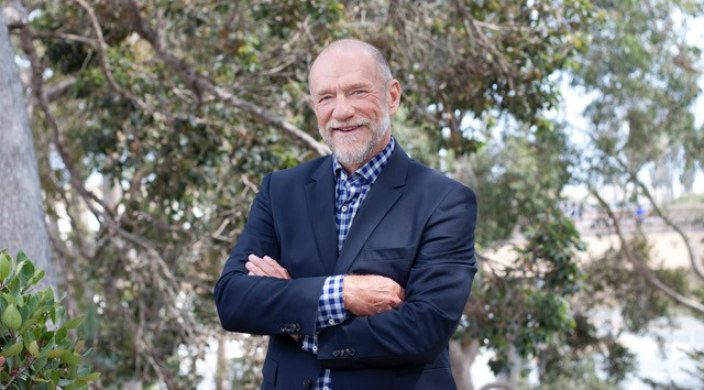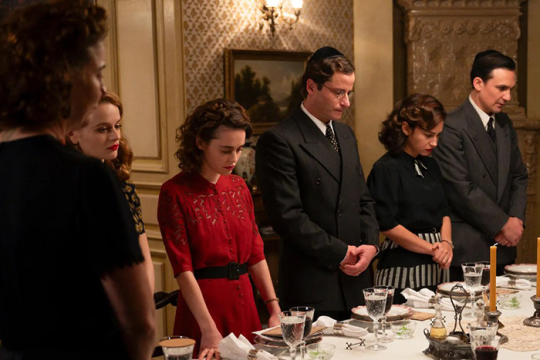
Noah benShea is the international best-selling author of the Jacob the Baker series, translated into 18 languages. Jacob is a poor but pious baker who lives an anonymous life and writes notes to himself, trying to make sense of his life, until one of his notes is accidentally baked into a loaf of his bread. When a woman finds the note and Jacob is “discovered,” suddenly people from near and far come to Jacob with their questions about life, loss, prayer, and love.
ReformJudaism.org: The Union for Reform Judaism (URJ) had a significant hand in the creation of the original Jacob the Baker in 1989. Since then, you’ve authored three more books in the series, including your new book, We Are All Jacob's Children: A Tale of Hope, Wisdom, and Faith. Where does Noah benShea end and your fictional character begin?
Noah benShea: First of all, thank you, URJ. To your question, Jacob and I share the same persona, but I’m the one with character flaws. Having been with him for over 40 years, I can say that I’m a better man for having inhabited Jacob’s soul and written in his voice.
You write, “People of all faiths are of one faith, if their religion is kindness.” Is Jacob both a Jewish and universal figure?
I was once interviewed on a radio show, and a woman called in to say, “Just by listening to you, I can tell you’re a good Catholic.”
The host later asked how I felt to hear that. I told him I was deeply honored because the caller took me, and Jacob, into her spiritual heart.
To me, Jacob is a profoundly Jewish figure, but his spiritual message of hope and kindness transcends any one religion.
What does Jacob mean when he says, “prayer is hope with wings?”
At some point we all teeter on a cliff, trying to deal with anxiety, fear, or loss. Hope affords us the company of prayer, and prayers are the wings to faith.
Here is a staircase for your soul.
In prayer find faith.
In faith find grace.
In grace find peace.
Jacob misses his wife, Ruth. How does he speak about coping with the loss of a loved one?
The veil between the worlds is very porous. Those who have gone away are not gone.
“The absent bird,” says Jacob, “does not leave us absent of its song.”
And Ruth reminds Jacob, “Do not weep at what has passed; smile that it passed our way.”
Feelings are seasons, and seasons change.
Think of the tides in life as the pulse of God.
Jacob says, “If we’re busy hugging the past, we can’t embrace the future.” Why is living in the present so important?
Think of yourself as a time machine.
In your memory you can experience the past.
In your imagination you can experience the future.
But you can only steer in the present.
And always keep in mind: the Hand on the Helm is larger than yours.
What does Jacob say about overcoming fear with faith?
Jacob tells us to imagine that all your feelings and possessions are in a wagon.
To pull this wagon you have been given a team of 10 horses. But because all of us have much more fear than faith, let us say that nine of these horses are horses of fear and one is a horse of faith.
If you put any of the horses of fear at the front of your wagon, they will give you all the excuses you ever give yourself, or others have ever given you, for why you can’t do something. And the wagon doesn’t go anywhere.
But if you put the one horse of faith at the front of the team, the horses of fear will follow. Your fears will be a source of strength for your faith, if you put your faith and not your fears in charge.
To what extent are the Jacob the Baker books a compass to healing?
Jacob says, “Everyone crying isn’t crying out loud. And even the best of us can be washed in tears.”
But, “Over every finish line in life,” says Jacob, “are the words, ‘Begin here!’”
The work of becoming who we might yet be, combined with the work of tikkun olam, the healing of our world, is a full-time job.
We’re not responsible for what the world delivers to our doorstep. We are responsible for our response. Respond don’t react.
And as Rabbi Tarfon reminds us in Pirkei Avot, “We’re not expected to finish the work, but neither are we excused from it.”
For more information about Noah benShea, visit his website. We Are All Jacob's Children: A Tale of Hope, Wisdom, and Faith and other books in the Jacob the Baker series are available in bookstores and on Amazon.
Related Posts

This Summer's Hottest Jewish Films and Series

“We Were the Lucky Ones:” Bringing The Holocaust Out of History Books and Into Our Homes

